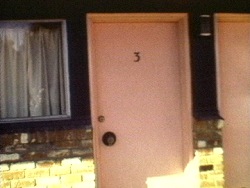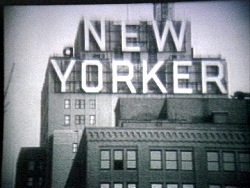Blurring the line between documentary and fiction, truth and artifice, Meet the People presents fourteen "characters" who face the camera in "talking head" close-ups and speak about their lives and dreams. The intimacy and honesty of their fragmented, "autobiographical" storytelling is illusory;...
Things I Forget to Tell Myself is an elusive observation of the disclosing and withholding of information, what is and isn't shown, what is and isn't seen. Asks Silver, "Once it is seen, how is it read?" Images and sounds recorded in the streets of New York City are rhythmically intercut with a...
Silver describes getting in as a tape about "heterosexual sex and the architecture of Northern California." The rest is for the viewer to decipher.
In this compelling "trailer," Silver constructs an evocative and elusive montage of disjunctive narrative threads — glimpsed images, dramatic snippets of sound and provocative fragments of text — in a pastiche of stylized black-and-white film and color video verite. Documentary? Fiction? Silver...
Silver refers to We as "a tape about perception, assumption, the text, the facts."
Description
Interweaving documentary, essay, and fiction, Silver explores how we negotiate cultural and popular narratives to arrive at definitions of the self. Shelly Silver: Selected Works brings together a number of her early video works, tracing her developing concerns with identity, narrative and text.
Blurring the line between documentary and fiction, truth and artifice, Meet the People presents fourteen "characters" who face the camera in "talking head" close-ups and speak about their lives and dreams. The intimacy and honesty of their fragmented, "autobiographical" storytelling is illusory; the credits reveal that these people are professional actors, playing fictional roles, reading a script. As Silver writes, "This work points to a complicity on the part of the viewer in his desire to believe and identify with the traditions of and characters on TV. The same television that mimics a perfected form of the identity of the 'average person' is also in part responsible for creating this identity; it both researches, uses and manufactures this 'average person's' hopes and dreams. And so the question of a 'real person' becomes 'real compared to what?'"
Things I Forget to Tell Myself is an elusive observation of the disclosing and withholding of information, what is and isn't shown, what is and isn't seen. Asks Silver, "Once it is seen, how is it read?" Images and sounds recorded in the streets of New York City are rhythmically intercut with a fragmented sentence: "We waste time on absurd clues and pass by the truth without suspecting it." A hand is placed in front of the camera to frustrate vision, so that the viewer glimpses only parts, instead of the whole. This enigmatic work questions not only the fragmentation of seeing and reading information, but the fragmentation of meaning as well.
Silver describes getting in as a tape about "heterosexual sex and the architecture of Northern California." The rest is for the viewer to decipher.
In The Houses That Are Left (Trailer), Silver constructs an evocative and elusive montage of disjunctive narrative threads — glimpsed images, dramatic snippets of sound and provocative fragments of text — in a pastiche of stylized black-and-white film and color video verite. Documentary? Fiction? Silver builds a mesmerizing, staccato rhythm of light and dark, sound and silence, text and image: brief bursts of cinematic orchestration and sound effects; gestures and dialogue of "characters" from a fictional melodrama, abbreviated answers to "people-in-the-street" interview questions. Questions of race, age and marital status converge with self-descriptions in an enigmatic inquiry into contemporary identity, constructed from the roles and narrative conventions of cinema and television.
We juxtaposes text, music and sexual images to create a complex work about narrative and identity. Silver refers to We as "a tape about perception, assumption, the text, the facts."
Meet the People: Carol Weinstein, Gahan Haskins, Lisa Wo, Peter Onorati, Leila Kenzle, Lloyd T. Williams, Jeremiah Bosgang, Camille Marshall, Kurt Erickson, Maureen Curtini, Annie Rae Etheridge, Brenda Lynn Bynum, Elizabeth Rose, Rita Perrault. Writer/Director: Shelly Silver. Director of Photography: John Kraus.
Things I Forget to Tell Myself: Camera/Obstruction: Abby Levine, Shelly Silver, Rick Wright. Sound: Rick Wright. Production Coordinator: Michael Halper. Post Production Coordinator: April Beer.
The Houses That Are Left (Trailer): Writer /Director: Shelly Silver. With: Judy Blazer, Maggie Low, Doug Barron, Larry Maxwell, Felice Neals, Ted Rebich, Talph Tachuk. Director of Photography: John Kraus. Interview Photography: Kim Higgins. Music: Gusztav Mahler.
We: Text: Thomas Bernhard's "Correction." Music: Henry Mancini, Leaping Pad.





